- Home
- Joseph Bruchac
The Long Run
The Long Run Read online
THE
LONG
RUN
JOSEPH BRUCHAC
Library of Congress Cataloging-in-Publication Data is available upon request.
© 2016 Joseph Bruchac
Cover and interior design: John Wincek
All rights reserved. No portion of this book may be reproduced by any means whatsoever, except for brief quotations in reviews, without written permission from the publisher.
7th Generation
an imprint of Book Publishing Company
PO Box 99, Summertown, TN 38483
888-260-8458
bookpubco.com
nativevoicesbooks.com
ISBN: 978-1-93905-309-1
21 20 19 18 17 16 1 2 3 4 5 6 7 8 9
Book Publishing Company is a member of Green Press Initiative. We chose to print this title on paper with 100% postconsumer recycled content, processed without chlorine, which saved the following natural resources:
21 trees
658 pounds of solid waste
9,823 gallons of water
1,811 pounds of greenhouse gases
9.75 million BTU of energy
For more information on Green Press Initiative, visit www.greenpressinitiative.org. Environmental impact estimates were made using the Environmental Defense Fund Paper Calculator. For more information visit www.papercalculator.org.
the long run
CONTENTS
1
Seattle
2
Reasons
3
The Bus
4
Missoula
5
A Good Ride
6
Good People
7
Sioux Falls
8
The Senator
9
Big Rig
10
His Grandparents’ Cabin
11
Gone
About the Author
1
Seattle
Travis Hawk stared toward the bay. “I want to run,” he said.
His voice was soft, and no one heard him.
He stood in the downstairs doorway. It was early. The street was quiet. No one else was up yet. He’d been planning to run. Run down and up the hills. Run with the salt air in his face. Run with the wind at his back. Run, run, his feet striking the ground like the soft beat of a drum.
Running was one thing he was good at doing. Travis had long legs. He was only seventeen, but his chest was broader than the chests of many men. That made space for his lungs. He could run for miles and not gasp for breath.
“Young man, you were born for this.” That was what the cross-country coach had said, trying to get Travis to join the team. But Travis couldn’t do that.
“I have to go home after school,” he told the coach.
When he said that, it made him sad. It wasn’t true because of one word. That word was “home.” He didn’t have a home.
Travis lived in a homeless shelter with his father. His mother had died when Travis was twelve. His father had been on his way home from Iraq when it happened. She died from something called meningitis. Travis hated that word “meningitis.” Hearing it reminded him of two things. The first was his mother’s sudden death. She was healthy one day and then gone three days later. The second thing the word reminded him of was his father’s anger.
“Meningitis!” It was the first thing his father said when Travis saw him at the funeral. He said it like a curse word.
His father kept saying that word. The more he drank, the louder he said it. He shouted it at Travis and at Grandma Kailin and Grampa Tomah.
His father was a skilled carpenter. But there were no jobs for him in Maine.
“Travis can stay with us,” Grampa Tomah had said.
“I’m his father. He needs to be with me. I can take care of him. I can get work anywhere.”
But anywhere turned out to be everywhere. They went wherever there was work. Or wherever there might be work. Over the last four years his father had worked in ten different states. And wherever he went, Travis went with him.
“You need me,” his father said. “And I need you.”
That was why Travis could not do cross-country running. He couldn’t stay after school. He had to go home as soon as school was over. His father expected that. Even if he was not yet back at the shelter, Rick Hawk expected Travis to be there waiting for him.
The only free time Travis ever had was early morning. That was when he could run.
But not today. It was raining too hard. He only had one pair of shoes. Good running shoes. Secondhand, but almost new. The only nice thing his father ever got him. Travis didn’t want them to get soaked.
Rain. That was nothing new.
“It’s Seattle,” Travis thought. “It’s a city named for a dead Indian. What else should anyone expect here?”
“It rains here a lot,” his father had said when they arrived in the city. Then his father had made a joke. “If you live here long enough, you grow gills like a fish.”
“Or you start to drink like a fish,” Travis thought.
His father was still asleep. He hadn’t moved since he fell into bed late last night. Travis had checked to make sure he was still breathing. He wasn’t dead. He was just drunk. A drunk Indian.
“I will never get drunk,” Travis thought.
The homeless shelter was on a hill. Everything in Seattle was on a hill. Travis looked toward the bay. He couldn’t see it. The rain was too heavy. But he could smell the bay. He could hear the cries of gulls and the WHOOOONK of the foghorn on the ferryboat.
Mount Rainier was out there on the other side of the bay. But Travis couldn’t see Mount Rainier either.
“Just wait,” his father had said. “You’ll see it.”
It was the same way his father talked about getting work.
“Just wait,” Rick Hawk would say. “I’ll get a good job here. I’ve been in Seattle before. I know my way around. I used to work here years ago. I have friends here.”
He had found some of those friends. Lenny Black was one of them. Lenny was a construction worker like Rick Hawk. They had met while working on a job together the first time Rick lived in Seattle. Lenny’s wife was named Lenore. L and L. That was what they called themselves. They were both ten years older than Travis’s father. They had round, friendly faces. Lenore was over six feet tall and Lenny was even taller. He had to duck his head when he walked under a doorway. They were both from the Colville Reservation. They had saved up and bought a two-story house in the east end of Seattle.
Rick and Travis stayed at Lenny and Lenore’s house at first. Their house was not big, but lots of people stayed there. Some just visited for a night. Some stayed for weeks at a time. All of them were Indian. L and L’s Free Hotel—that’s what everyone called Lenny and Lenore’s house.
“The economy is down now,” his father had said. “It has to pick up. There’s always a job for a good carpenter.”
But he did not find a job. He did find some other friends. They went drinking together. At first it was just on Saturday nights. Then it was every night.
Travis liked it at Lenny and Lenore’s. They never drank anything except water.
Every night at dinner Lenny would do the same thing. Before they ate he would hold up a full glass of water.
“This is one of the best gifts the Creator gave us,” Lenny always said.
Neither Lenny or Lenore ever spoke a harsh word to anyone. But Travis and Rick had to leave. One night in February, Travis’s father came in late. He smelled of alcohol. His hair was wet from the rain. There were bruises on his face. He looked like an angry grizzly bear.
“They threw me out of the bar,” he growled. His voice w
as thick from drinking. “After all the business I gave them!”
His eyes were half closed as he spoke. Travis knew what was going to come next.
“No, Dad,” he said. “No!”
His father ignored him. He picked up a plate from the dish drainer. He lifted it up and smashed it on the floor.
Travis held out his hand. “Dad,” Travis said, “that’s not our stuff. Please stop.”
His father grabbed his arm. He pushed him out of the room and threw him onto the floor.
Travis wasn’t hurt much. He knew how to fall.
His father went back into the kitchen. He kept breaking things. Cups, glasses, plates. Travis just sat on the floor. Blood was dripping from his lip. His father’s elbow had struck him there. He knew his father didn’t mean to do that, but it still hurt.
Lenny came downstairs. He reached out and helped Travis to his feet. He used a tissue to wipe the blood off Travis’s lip. Someone put an arm around Travis and squeezed his shoulders. It was Lenore.
Lenny went to the kitchen door. He didn’t go into the kitchen.
“Brother,” Lenny said. He didn’t shout. He just spoke that one quiet word, “brother.”
Rick Hawk looked at them. He looked at the plate in his hand. He stared at it as if he had never seen a plate before. Then he put it down gently on the kitchen table. He turned and walked out the door into the cold rain. He did not come back till the next afternoon. Travis had already packed their bags.
“You don’t have to leave,” Lenny said.
“Yes, we do,” Rick Hawk replied. He gave Lenny a handful of dollar bills.
“For what I broke,” he said.
Lenny took the money and shoved it into his shirt pocket.
Lenore hugged Travis hard. “Take care of your father,” she whispered to him.
“I can’t,” Travis thought. But he nodded anyway.
They moved first into a one-room apartment in a building that smelled like burned grease. The bathroom was down the hall. The shower was broken.
“This shower is just like me,” his father joked. “It don’t work.”
It was all they could afford. They only stayed there for two months and then the money ran out. They had to leave the apartment and go to the first shelter.
The people who ran the shelter meant well. Seattle was proud of its homeless shelters. They kept them clean and gave people decent food. They had training programs to help people find work. They even had special shelters for homeless young people who didn’t have parents with them. Travis wondered if he would have been happier at one of those shelters. Probably not.
The shelter they were in now was their second one. The first one had been on the other side of town.
When they arrived at that first shelter, Travis made a friend. His name was Will Chan. He was the same age as Travis. He was in the shelter with his father too.
Will and his father had been homeless for five years. But Will was not depressed. His father had a hard time finding a job, but he didn’t drink a lot.
“My dad just likes to travel,” Will said. “He used to be some sort of hippie. He likes it on the road. I guess I do, too. It’s like we are wandering monks from the old days in China, fighting evil landlords and saving pretty girls.”
Will smiled as he said that.
Will was always smiling. He gave Travis a nickname: Brother Hawk. Travis liked the sound of it. Will told Travis about things he had learned from being homeless.
“It’s not bad, Brother Hawk,” he said. “Take food, for example. You can always find food in the city. You check out the bins behind the grocery stores. Every night they throw out tons of stuff. Or go to the dumpsters behind the best restaurants.” Will chuckled, and his face creased into a big smile. “Man, you would not believe what people leave on their plates. And you can sleep pretty good in a cardboard box. It doesn’t need to be that big. Smaller ones stay warmer. And bad weather is no problem. Just put plastic bags over the top. Then it doesn’t get soaked in the rain.”
Will also had a book about survival.
“Check this out, Brother Hawk.”
It was the coolest book Travis ever saw. Will loaned it to Travis. Travis read it from cover to cover three times. It talked about everything. It told how to survive on your own in the forest and in the city.
“We can go camping sometime,” Will said. “We’ll take nothing with us but a blanket and a knife. We’ll build shelters like those in the book. We’ll live off the land.”
That never happened. Will and his father left soon after Travis arrived.
Will had the survival book in his hand when they said goodbye.
“I thought about giving this to you,” Will said. He wasn’t smiling.
Travis shook his head. “No,” he said. “You keep it.” He tapped his head. “I’ve got it all in here.”
Will smiled then. “Brother Hawk, you are one cool dude.”
They slapped palms and fist-bumped.
“Stay strong, my friend,” Will said.
“You too.”
A week later, Travis and his father had to move. Rick Hawk didn’t tell him why. It just happened. One day they were in the shelter near the east side. The next day they were up on the hill on the other side of the town.
Travis looked out again at the foggy bay. They had been in Seattle for six months. They had arrived in November. Now it was almost June. All that time the mountain had been hidden by clouds.
Travis knew a lot about Mount Rainier. He hadn’t learned it at school. He had read it on his phone. He knew how tall it was. He knew why it was called Mount Rainier. He knew its Native name. Its Native name was Tahoma. He had even found a story about the mountain told by Chief Seattle’s people. They said the mountain was alive. A fire spirit lived inside it. One day that spirit would wake up. That spirit did not like it when people climbed the mountain.
What would it be like to climb Mount Rainier? His father had climbed Mount Rainier before Travis was born. He had told Travis about that climb.
It had taken Rick Hawk two days to make the climb. All he had with him was a small backpack with a sleeping bag. He had carried a pouch of tobacco that was a gift for the mountain. It was cloudy as he climbed. It was cloudy when he made his camp for the night. It was still cloudy the next day. When he reached the top, the wind swept away the clouds. He could see for miles. He saw all of Puget Sound. He saw the mountains all around.
“It was wonderful,” his father had said. “I felt as if I was in the sky land.”
Then he told Travis a story.
“Long ago,” Rick Hawk said, “the sky land was close to the earth. That was before this city was here. Back then the animals and people all lived together. They shared everything. The sky land was so close that the people and animals could just jump up into it. There was lots of food up there. There were lakes and streams. The sun was always shining, and it was always warm. It was beautiful up there in the sky land.”
Rick Hawk had been smiling when he told the story. It made Travis feel good to see his father smile. When his dad wasn’t drinking, he was the greatest father.
“Someday,” Rick said, “you and I will climb that mountain.”
Travis almost believed it.
Someday. Rick Hawk often said that. Someday.
Someday was never today.
Travis had never climbed a mountain.
His father had been the same age as Travis when he first climbed a mountain. He’d climbed it with Grampa Tomah. That mountain was called Ktaahdin. It was the biggest mountain in Maine. But that was years ago.
Grampa Tomah was too old now to climb mountains. Maine, where he lived, was three thousand miles away. Travis had lived there with his dad when Travis was little. After Mom died.
“Someday,” Rick Hawk would tell Travis, “we’ll go back there. We’ll go see your grandparents again. Someday.”
Someday.
Travis knew that “someday” actually meant never. Rick Hawk wou
ld never take Travis to see Grampa Tomah and Grandma Kailin. He’d never take Travis mountain climbing. The only thing Rick Hawk climbed now were the stairs in the shelter. And that was usually late at night. He stumbled up those stairs as he climbed. Like last night.
“Travis,” he had called, his voice slurred. “Travis, come help me.”
Travis had helped him. When they got to their room, his father pushed him into the wall. Then he punched him in the stomach. Rick Hawk was like that when he was drunk. He hit people. Hard.
He also said things he didn’t mean when he was drunk.
“You are useless, kid. Useless,” he had said. “Why do I have to take care of you? You just hold me back. Useless.”
Travis put his hand on his stomach. He felt the bruise there. But what his father had said hurt more.
Useless.
I’m not useless. I can run. That’s one thing I can do.
Travis looked out the doorway. The rain had finally stopped. But the fog had become thick. All he could see was the fog. His eyes were wet from the mist.
Pike Place Market was somewhere down there. People were down there doing things. People were always doing things in Seattle, even when it was cool and rainy. They were real people with real lives. Travis wished he was one of them.
“I’m tired of being afraid,” Travis said. He said it softly to himself.
Then he shook his head. No, that wasn’t it. It wasn’t about being afraid. He was tired of always expecting things to be the way they were.
“I can’t stay here,” Travis thought. The thought surprised him. “But how can I leave my father?”
Then another thought hit him. It hit him harder than his father’s drunken fists.
I have to leave. I have to run. Not tomorrow. Now!
2
Reasons
Travis looked at his sleeping father. His face was peaceful. Rick Hawk never looked angry when he was sleeping.

 Peacemaker
Peacemaker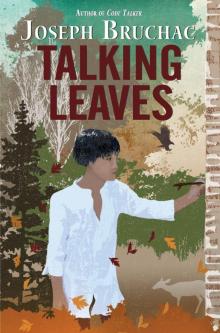 Talking Leaves
Talking Leaves Found
Found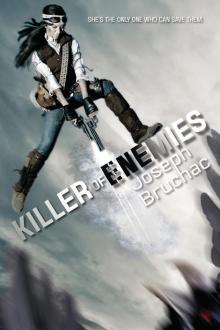 Killer of Enemies
Killer of Enemies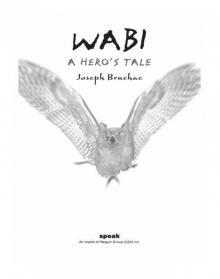 Wabi
Wabi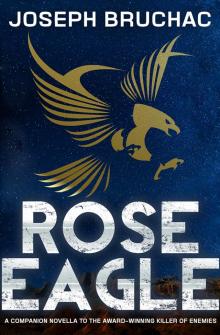 Rose Eagle
Rose Eagle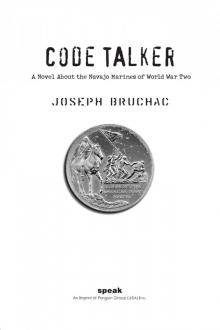 Code Talker
Code Talker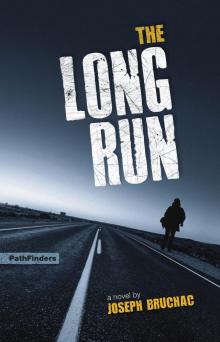 The Long Run
The Long Run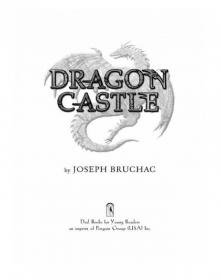 Dragon Castle
Dragon Castle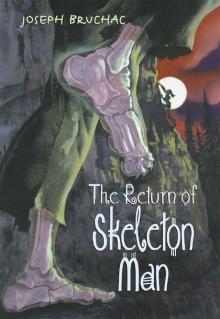 The Return of Skeleton Man
The Return of Skeleton Man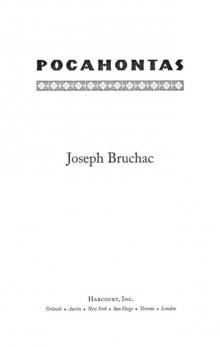 Pocahontas
Pocahontas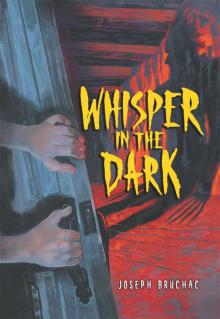 Whisper in the Dark
Whisper in the Dark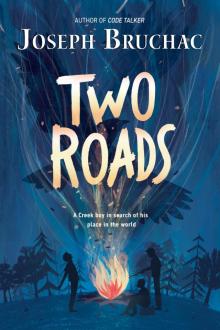 Two Roads
Two Roads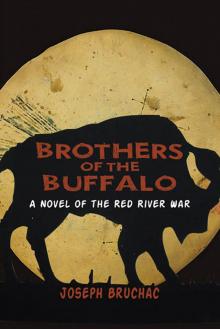 Brothers of the Buffalo
Brothers of the Buffalo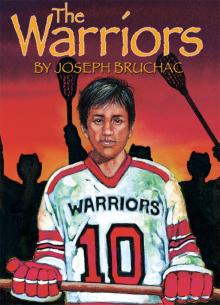 The Warriors
The Warriors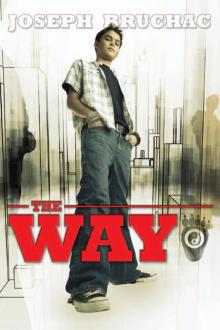 The Way
The Way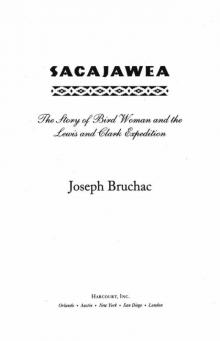 Sacajawea
Sacajawea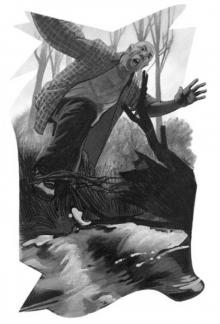 Night Wings
Night Wings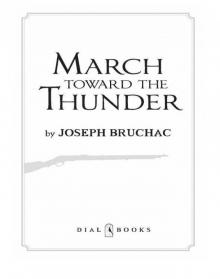 March Toward the Thunder
March Toward the Thunder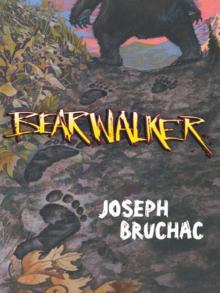 Bearwalker
Bearwalker Skeleton Man
Skeleton Man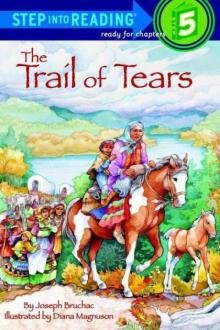 The Trail of Tears
The Trail of Tears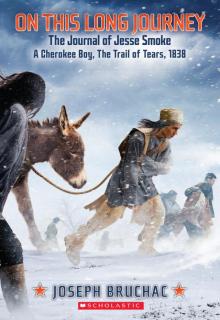 On This Long Journey
On This Long Journey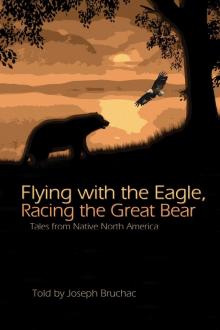 Flying with the Eagle, Racing the Great Bear
Flying with the Eagle, Racing the Great Bear